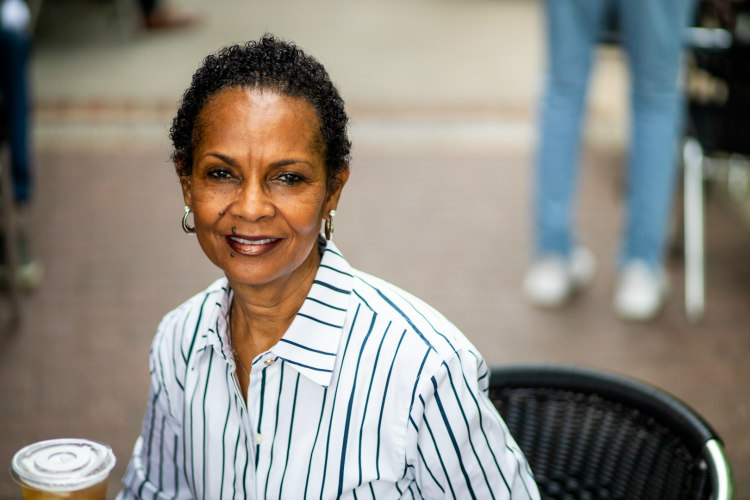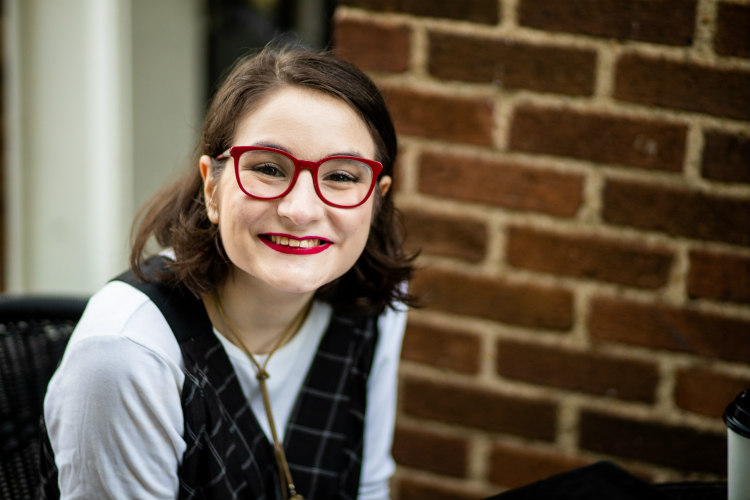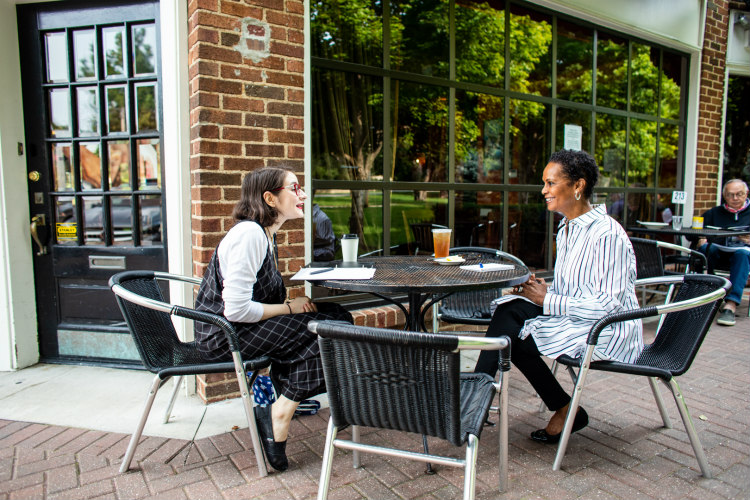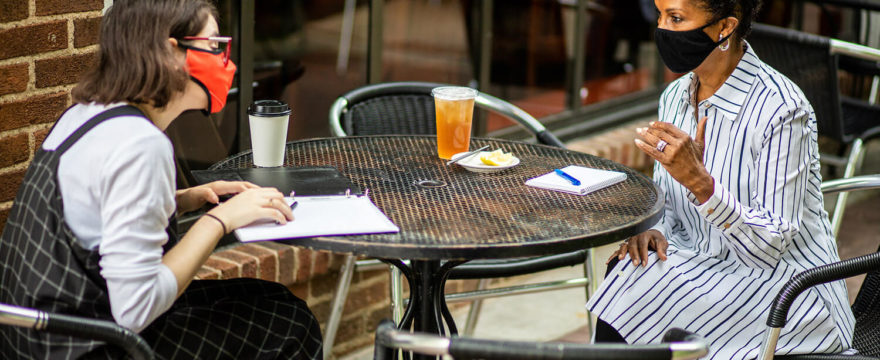Dynamic duo share passion for giving back to community
The heart of UMKC is our campus community. With lots of opportunities, it’s easy to develop student mentorship teams. And these rich relationships—our Dynamic Duos—are some of our best success stories.
Debby Ballard and Ruby Rios met during Rios’s interview for the UMKC Trustees’ Scholars program in 2018. Ballard serves as Rios’s well-matched mentor as the computer science major manages online courses, living at home, a focused ambition and a desire to give back.
Ballard, president of the Sprint Foundation, is a UMKC Trustee who has deep and broad experience in community development. She serves on several community advisory boards and boards of directors including the Kansas City Girls Preparatory Academy and the Kansas City Chamber of Commerce. But in addition, she devotes time and energy into her mentoring relationship with Ruby Rios, ’21.

Rios is a UMKC Trustees’ Scholar. At the encouragement of her father, she started coding in fifth grade. While she was in high school, she started two Girls Who Code clubs in Kansas City, which led to her participating in a roundtable discussion with Nobel Peace Prize laurate Malala Yousafzai.
Ballard and Rios have sustained their mentoring relationship since the COVID-19 pandemic sent them to work from home in March. Cognizant of the scope of the effects of the disease, both women have recognized what they have lost, but are capitalizing on the lessons this crisis has brought them.
Tell me how you met originally.
Ballard: I met Ruby during the Trustees’ Scholar interviews. I was on the committee and was impressed with her from day one. I love the fact that she had this technology background, but she also had this passion for philanthropy and for giving back. That’s my world.
It was a natural fit when you think about it, as I work for a technology company. But more importantly the role that I play at that company supporting the community is one of the areas that Ruby’s interested in. It just made sense. It was a perfect fit. She was at the top of my list.
“The biggest advantage is having that person’s insight of, ‘Yes, you can do this. I’ve done it, and this is how I’ve done it.”
– Ruby Rios
Rios: I guess I’ll add in a little secret, and I don’t know if she’s heard this or not. But after meeting Debby at my interview, I was so impressed by her that when they were setting us up to have the mentor-mentee relationship, I specifically asked if I could be assigned to her as a mentee because she’s so impressive to me. Her previous mentee was graduating, which I consider the second luckiest thing that happened to me in college after getting the scholarship itself.
It sounds as if you had an immediate connection.
Rios: I did, even though I was super nervous and anxious.
Debby: She was a superstar to all of us. Even if she was nervous, it didn’t come across that way. She came across as confident, you know? Ruby’s smart – that goes without saying – but I think she also had a maturity that you don’t see that often.
She really has goals and plans and has worked them. A lot of times — not just young people but all throughout careers — people will set some goals and set a plan, but they don’t work it. That’s like not having one.

Did you meet regularly before COVID? Are you meeting now?
Ballard: You know, it’s sporadic. [Before the shutdown] we met as needed, either for breakfast or lunch. Since, we’ve met a few times by Skype.
Rios: She’s introduced me to some of the best eating places in Kansas City – Classic Cup, Seasons 52, Summit Grill.
Ballard: We do try to find different places. But I also make a point of bringing her with me if I am going to something where I think she would be interested or have job networking opportunities.
Rios: Debby has been one of the sweetest individuals and has invited to some really cool events in Kansas City. I always get a good feeling when I’m with her.
When you guys get together, are you mostly, focused on school and career, or are you friends and you talk about family and food?
Ballard: We cover a little bit of the personal stuff, because I think it’s important to know the whole person. So, we cover that, but I would say we also are very intentional about Ruby.
I’ve had a lot of mentees over the years, and a lot of times they just kind of come and there’s no agenda. She always has an agenda. She has great questions, and so we’re pretty focused on what she wants to cover during that meeting and what we’re going to get out of it. There’s always a goal or objective for what we’re going to be talking about. This is one of the things that impresses me about her.
Ruby, do you have a plan after graduation?
Rios: Yes! Of course!
“I realized that because of how my schooling was being disrupted by COVID, I had a unique opportunity to be able to really focus on and work towards graduating early.”
– Ruby Rios
Do you want to share it?
Rios: It’s a work in progress. I’m still getting all the kinks worked out.
Because of the pandemic, I am really able to focus in on being a full-time student. I’m taking some classes that I had previously thought I should spread out with some business classes. I’m taking more difficult classes at the same time because there’s not really much else to do. My plan is to graduate this summer.
So, you’ll graduate early?
Rios: Yes. I realized that because of how my schooling was being disrupted by COVID, I had a unique opportunity to be able to really focus on and work towards graduating early. And then, after COVID, I’ll have the opportunity to go and do the fun stuff that right now I’m not able to do with a little bit more financial backing than I currently have.
That sounds really impressive.
Ballard: Right, definitely. I think she’s amazing.
Ruby, what do you think is the advantage of having a mentor?
Rios: I think there are a lot of advantages. Debby is amazing, and helps me in so many ways that it would be impossible to list all of them. But I think the biggest one is that I have an example of someone who’s entered the career path that interests me. And because of that, I now have the ability to see how I could do that myself. I think a lot of college students feel very lost in terms of how to go about thinking through a career plan and starting the career they want.
It’s really nice to have somebody who’s been down that road who’s helping to steer the car. And I’m able to learn a little bit more about adulting and have conversations with a professional person. But the biggest advantage is having that person’s insight of, “Yes, you can do this. I’ve done it, and this is how I’ve done it.”
“I believe that ‘you have to see it to be it.’ And I think what I have allowed Ruby to do is really see somebody doing the job that she wants, and the work that she wants to be able to do.”
– Debby Ballard
Debby, is there an advantage of having a mentee?
Ballard: It’s really, really satisfying and for both of us. It’s a safe environment for Ruby to really be herself and to ask questions that maybe she wouldn’t feel comfortable asking a lot of different people.
But I also believe that “you have to see it to be it.” And I think what I have allowed Ruby to do is really see somebody doing the job that she wants, and the work that she wants to be able to do. It gives me the opportunity to help shape her future and to impart any knowledge that I might have.
And then it gives me the opportunity to watch her grow into what she wants to be. I think mentoring is important at every stage because it does help you to get to the next step whatever that is. I’m just pleased to be able to be a part and to watch her move to the next step. That’s wonderful.

Did you have a mentor?
Ballard: I have had mentors all throughout my career at Sprint, and really good ones who provided really good advice. It doesn’t matter where you are in your career, a mentor is always a good thing. It’s good having people at the table who can speak for you.
Ruby, I know that you’ve been involved with people who are younger than you already but, does your relationship with Debby make you want to be a mentor?
Rios: 100%. I’ve always held the belief that wherever you are in life you need to reach back out and help the people who aren’t there yet. And so, I have been a mentor for robotics teams. I’m the coach of my own Junior FIRST Lego League Girl Scout team. So as much as I’m able to – even though I don’t have much wisdom to impart quite yet — I know that it’s important for girls to be able to see that somebody like me in tech exists. They need to know that as a young person, they are as capable — if not more capable than I am — of doing some of the very cool things I’ve had the opportunity to be able to do.
Story by: Patricia O’Dell, odellpa@umkc.edu
Published: Oct 6, 2020

